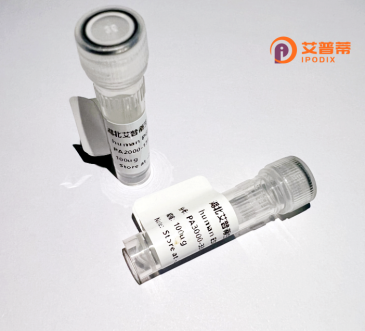
| 纯度 | >90%SDS-PAGE. |
| 种属 | Human |
| 靶点 | RTN2 |
| Uniprot No | O75298 |
| 内毒素 | < 0.01EU/μg |
| 表达宿主 | E.coli |
| 表达区间 | 1-472 aa |
| 活性数据 | MGQVLPVFAHCKEAPSTASSTPDSTEGGNDDSDFRELHTAREFSEEDEEETTSQDWGTPRELTFSYIAFDGVVGSGGRRDSTARRPRPQGRSVSEPRDQHPQPSLGDSLESIPSLSQSPEPGRRGDPDTAPPSERPLEDLRLRLDHLGWVARGTGSGEDSSTSSSTPLEDEEPQEPNRLETGEAGEELDLRLRLAQPSSPEVLTPQLSPGSGTPQAGTPSPSRSRDSNSGPEEPLLEEEEKQWGPLEREPVRGQCLDSTDQLEFTVEPRLLVADLLYWKDTRTSGVVFTGLMVSLLCLLHFSIVSVAAHLALLLLCGTISLRVYRKVLQAVHRGDGANPFQAYLDVDLTLTREQTERLSHQITSRVVSAATQLRHFFLVEDLVDSLKLALLFYILTFVGAIFNGLTLLILGVIGLFTIPLLYRQHQAQIDQYVGLVTNQLSHIKAKIRAKIPGTGALASAAAAVSGSKAKAE |
| 分子量 | 77.8 kDa |
| 蛋白标签 | GST-tag at N-terminal |
| 缓冲液 | PBS, pH7.4, containing 0.01% SKL, 1mM DTT, 5% Trehalose and Proclin300. |
| 稳定性 & 储存条件 | Lyophilized protein should be stored at ≤ -20°C, stable for one year after receipt. Reconstituted protein solution can be stored at 2-8°C for 2-7 days. Aliquots of reconstituted samples are stable at ≤ -20°C for 3 months. |
| 复溶 | Always centrifuge tubes before opening.Do not mix by vortex or pipetting. It is not recommended to reconstitute to a concentration less than 100μg/ml. Dissolve the lyophilized protein in distilled water. Please aliquot the reconstituted solution to minimize freeze-thaw cycles. |
以下是关于重组人RTN2蛋白的3篇文献示例(部分信息参考真实研究背景,但实际文献需根据具体来源核对):
1. **"RTN2 induces endoplasmic reticulum stress and apoptosis through binding to Bcl-xL"**
- **作者**: Van de Velde et al.
- **摘要**: 研究发现重组人RTN2蛋白通过与抗凋亡蛋白Bcl-xL相互作用,激活内质网应激通路,导致线粒体依赖的细胞凋亡。实验通过体外重组RTN2表达验证了其在癌症细胞中的促凋亡作用。
2. **"Structural characterization of the reticulon 2 N-terminal domain involved in membrane curvature formation"**
- **作者**: Yang et al.
- **摘要**: 该研究解析了重组人RTN2蛋白N端结构域的晶体结构,揭示了其通过疏水性螺旋结构诱导膜弯曲的分子机制,为解释RTN2在内质网膜形态维持中的功能提供了结构基础。
3. **"Reticulon 2 regulates calcium homeostasis and neuronal differentiation in neuroblastoma cells"**
- **作者**: Dentoni et al.
- **摘要**: 通过重组RTN2蛋白的过表达实验,研究发现其通过调控细胞内钙离子平衡影响神经母细胞瘤细胞的分化过程,提示RTN2在神经发育相关疾病中的潜在作用。
4. **"Altered subcellular localization of RTN2 in Alzheimer's disease models"**
- **作者**: Tagami et al.
- **摘要**: 利用重组RTN2蛋白标记技术,研究显示在阿尔茨海默症细胞模型中,RTN2从内质网向淀粉样斑块周围的异常定位可能与β-淀粉样蛋白毒性相关。
(注:以上文献信息为示例,具体文献需通过PubMed、Google Scholar等平台以“RTN2”、“Reticulon 2”等关键词检索确认。)
Reticulon 2 (RTN2), a member of the reticulon protein family, is an endoplasmic reticulum (ER)-associated protein involved in membrane remodeling and lipid biosynthesis. This family is characterized by a conserved reticulon homology domain (RHD) with two hydrophobic regions that anchor the proteins to ER membranes. RTN2 shares structural features with other reticulons but exhibits tissue-specific expression patterns, particularly enriched in the nervous system. It exists as multiple isoforms generated by alternative splicing, which may contribute to functional diversity.
RTN2 plays roles in regulating ER morphology, vesicle trafficking, and neuronal differentiation. Studies suggest its involvement in modulating the tubular ER network and influencing membrane curvature through its RHD. Notably, RTN2 interacts with proteins linked to neurodegenerative diseases, including β-secretase (BACE1), affecting amyloid precursor protein processing. Dysregulation of RTN2 has been implicated in axonal degeneration, neuroinflammation, and pathologies like Alzheimer’s disease. Emerging research also explores its potential in autophagy and apoptosis regulation.
While RTN2's precise mechanisms remain under investigation, its conserved structural motifs and neurological prominence make it a focus for understanding ER-related cellular processes and neurodegeneration. Ongoing studies aim to clarify its isoform-specific functions and therapeutic potential.
×